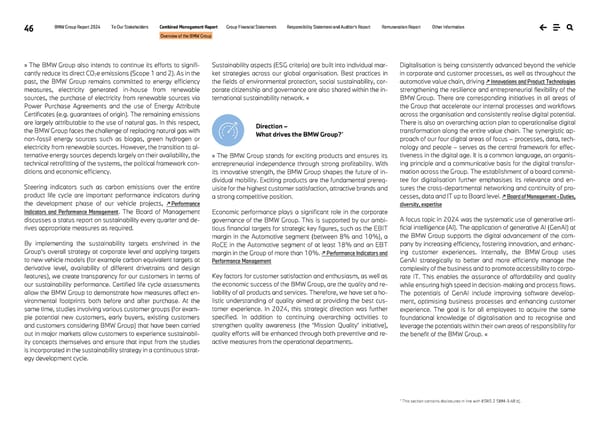46 BMW Group Report 2024 To Our Stakeholders Combined Management Report Group Financial Statements Responsibility Statement and Auditor’s Report Remuneration Report Other Information Overview of the BMW Group » The BMW Group also intends to continue its efforts to signifi- cantly reduce its direct CO2e emissions (Scope 1 and 2). As in the past, the BMW Group remains committed to energy efficiency measures, electricity generated in-house from renewable sources, the purchase of electricity from renewable sources via Power Purchase Agreements and the use of Energy Attribute Certificates (e.g. guarantees of origin). The remaining emissions are largely attributable to the use of natural gas. In this respect, the BMW Group faces the challenge of replacing natural gas with non-fossil energy sources such as biogas, green hydrogen or electricity from renewable sources. However, the transition to al- ternative energy sources depends largely on their availability, the technical retrofitting of the systems, the political framework con- ditions and economic efficiency. Steering indicators such as carbon emissions over the entire product life cycle are important performance indicators during the development phase of our vehicle projects, ↗ Performance Indicators and Performance Management. The Board of Management discusses a status report on sustainability every quarter and de- rives appropriate measures as required. By implementing the sustainability targets enshrined in the Group’s overall strategy at corporate level and applying targets to new vehicle models (for example carbon equivalent targets at derivative level, availability of different drivetrains and design features), we create transparency for our customers in terms of our sustainability performance. Certified life cycle assessments allow the BMW Group to demonstrate how measures affect en- vironmental footprints both before and after purchase. At the same time, studies involving various customer groups (for exam- ple potential new customers, early buyers, existing customers and customers considering BMW Group) that have been carried out in major markets allow customers to experience sustainabil- ity concepts themselves and ensure that input from the studies is incorporated in the sustainability strategy in a continuous strat- egy development cycle. Sustainability aspects (ESG criteria) are built into individual mar- ket strategies across our global organisation. Best practices in the fields of environmental protection, social sustainability, cor- porate citizenship and governance are also shared within the in- ternational sustainability network. « Direction – What drives the BMW Group?* » The BMW Group stands for exciting products and ensures its entrepreneurial independence through strong profitability. With its innovative strength, the BMW Group shapes the future of in- dividual mobility. Exciting products are the fundamental prereq- uisite for the highest customer satisfaction, attractive brands and a strong competitive position. Economic performance plays a significant role in the corporate governance of the BMW Group. This is supported by our ambi- tious financial targets for strategic key figures, such as the EBIT margin in the Automotive segment (between 8% and 10%), a RoCE in the Automotive segment of at least 18% and an EBT margin in the Group of more than 10%. ↗ Performance Indicators and Performance Management Key factors for customer satisfaction and enthusiasm, as well as the economic success of the BMW Group, are the quality and re- liability of all products and services. Therefore, we have set a ho- listic understanding of quality aimed at providing the best cus- tomer experience. In 2024, this strategic direction was further specified. In addition to continuing overarching activities to strengthen quality awareness (the 'Mission Quality' initiative), quality efforts will be enhanced through both preventive and re- active measures from the operational departments. Digitalisation is being consistently advanced beyond the vehicle in corporate and customer processes, as well as throughout the automotive value chain, driving ↗ Innovations and Product Technologies strengthening the resilience and entrepreneurial flexibility of the BMW Group. There are corresponding initiatives in all areas of the Group that accelerate our internal processes and workflows across the organisation and consistently realise digital potential. There is also an overarching action plan to operationalise digital transformation along the entire value chain. The synergistic ap- proach of our four digital areas of focus – processes, data, tech- nology and people – serves as the central framework for effec- tiveness in the digital age. It is a common language, an organis- ing principle and a communicative basis for the digital transfor- mation across the Group. The establishment of a board commit- tee for digitalisation further emphasises its relevance and en- sures the cross-departmental networking and continuity of pro- cesses, data and IT up to Board level. ↗ Board of Management - Duties, diversity, expertise A focus topic in 2024 was the systematic use of generative arti- ficial intelligence (AI). The application of generative AI (GenAI) at the BMW Group supports the digital advancement of the com- pany by increasing efficiency, fostering innovation, and enhanc- ing customer experiences. Internally, the BMW Group uses GenAI strategically to better and more efficiently manage the complexity of the business and to promote accessibility to corpo- rate IT. This enables the assurance of affordability and quality while ensuring high speed in decision-making and process flows. The potentials of GenAI include improving software develop- ment, optimising business processes and enhancing customer experience. The goal is for all employees to acquire the same foundational knowledge of digitalisation and to recognise and leverage the potentials within their own areas of responsibility for the benefit of the BMW Group. « * This section contains disclosures in line with ESRS 2 SBM-3.48 b).
 BMW Group Report 2024 Page 45 Page 47
BMW Group Report 2024 Page 45 Page 47